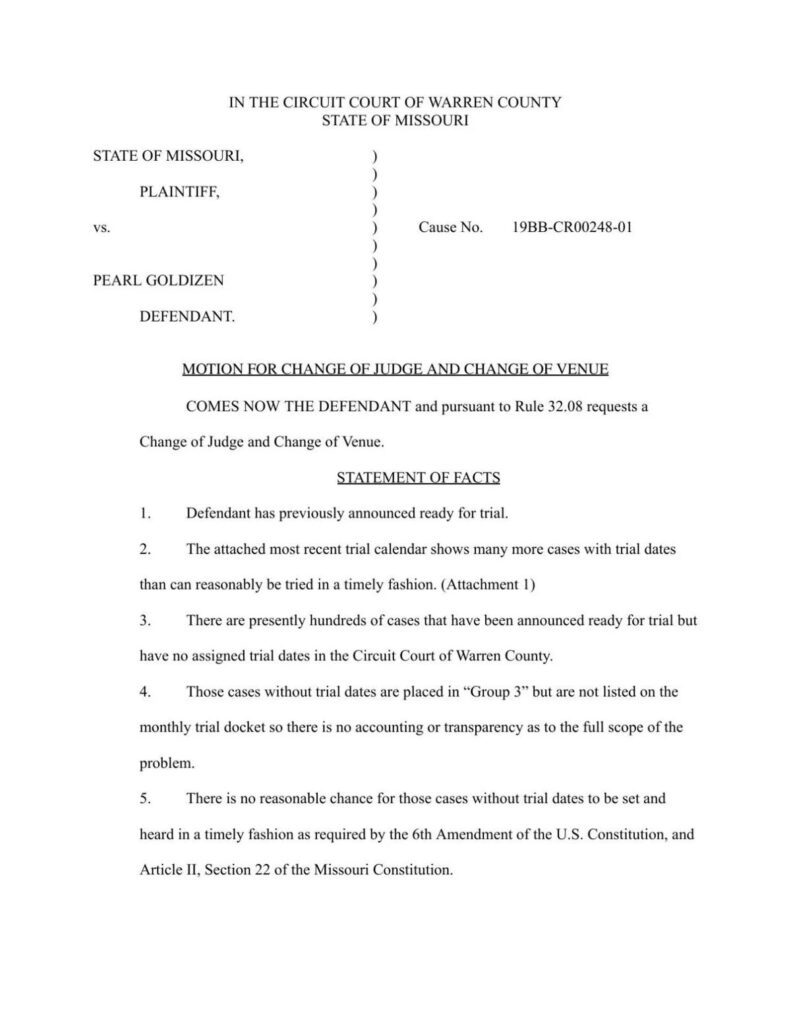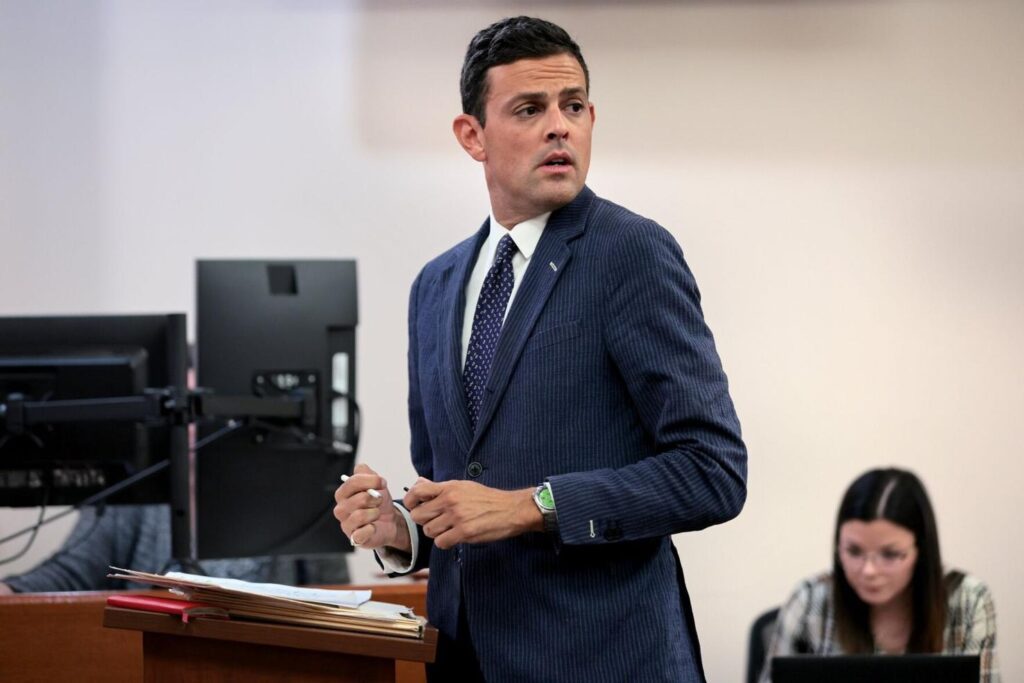Messenger: Defendants in a Missouri county wait years for justice. It can ruin their lives.
By Tony Messenger
WARRENTON — For nearly five years, Pearl Goldizen has walked under a cloud.
In October 2018, she was a passenger in a car that was pulled over for expired tags. There was marijuana in the trunk.
Goldizen, a single mom of five children, was living in St. Joseph at the time. In March 2019, she was charged with the Class C felony of “delivery of a controlled substance.” It was the first time she had been arrested, the first time she was charged with a crime.
It came at a precarious time for Missouri courts. About a year after Goldizen was charged, as the case was still making its way through the Warren County system, the COVID-19 pandemic shut down most Missouri courthouses and significantly slowed the progress of cases.
Most jurisdictions have since found ways to get caught up, or at least to reduce the number of backed-up cases.
But not Warren County. There, cases that are five years old or longer are still lingering, with people like Goldizen struggling to get their days in court. According to Missouri court records, there were more than 2,800 pending cases in Warren County as of April, a per-capita rate three times higher than neighboring St. Charles County.
For a person with an unresolved felony charge on their record, the delays have serious consequences.
“For the last four and a half years now, I’ve been just sitting on my hands. I can’t get a job because of the criminal charge on my background check,” Goldizen says.
She lives in the Kansas City area now, and every few months, she has to drive nearly three hours to Warren County for a court date.
“I can’t support my family,” she says. “I thought this was going to be done and over with by now.”
Her attorney, Chris Lozano of Chesterfield, says while all courts deal with COVID delays, “this is the only county that has this kind of backlog.”
The public defender’s office hires private attorneys like Lozano to take cases when there is a conflict of interest — such as multiple defendants in a case — or when the office has its own backup.
“She can’t get a job,” Lozano says of Goldizen. “She can’t get a house. She has found herself completely marginalized because this charge hangs over her head.”
The delays have put the constitutional right to a speedy trial in question for many Warren County defendants, while simultaneously creating a public safety problem when people facing violent charges aren’t held accountable for years.
Everybody in the Warren County court system, from Circuit Court Judge Jason Lamb to Prosecuting Attorney Kelly King to defense attorneys, acknowledges the serious delays in this rural county northwest of St. Louis that is becoming more exurban. According to the most recent U.S. Census numbers, Warren County is the second-fastest growing county in the St. Louis metropolitan statistical area, going from about 35,000 people in 2020 to more than 37,000 last year.
Lamb says the problems in Warren County — including a glut of criminal cases that involve drug addiction or mental health problems — are similar to challenges faced in courts across the country. Lamb’s courtroom is often packed with cases like this — possession of meth or opioids, or driving while intoxicated, for instance. Defendants come up one by one and often have their cases delayed for weeks, for one reason or another.
“I don’t think this is unique to us,” Lamb says.
He sits on a statewide criminal justice panel that is examining strategies to unclog court dockets. A major part of the discussion, he says, is focusing on people in jail who might better be served with treatment.
“Studies have absolutely shown the success of treatment courts and the promise of programs that identify substance abuse and co-occurring mental health issues at an early stage,” Lamb says.
His committee is investigating the “intercept model,” in which police, social workers, attorneys and judges intervene in drug and mental health cases earlier to divert people to treatment before their cases linger. He hopes some of the strategies can be applied in Warren County to reduce the clogged court docket.
But in the meantime, there are dozens of folks awaiting a trial with no clear dates for their days in court.
‘There may be a system problem’
Motions for a speedy trial are an important protection for defendants. They are often filed by defense lawyers when charges linger, and prosecutors have a difficult time proving a case and are unwilling to reduce or drop charges. A failure to meet the speedy trial request can lead a judge or appeals court to dismiss a case because the defendant’s constitutional rights have been denied.
Since 2020, there have been more than 170 motions for speedy trial filed in Warren County. As of April, nearly 30% of those cases were still pending. That’s three times the percentage of outstanding speedy trial cases than the other two counties in the 12th Judicial Circuit, Montgomery and Audrain. It’s also twice as high as other county courts in the region, including Franklin, St. Charles, Lincoln, Pike and Gasconade.
“If there are a large number of cases that are not being tried after speedy trial requests, there may be a system problem,” says former Missouri Supreme Court Judge Michael Wolff, the dean emeritus at St. Louis University Law School. “These congestion delays could be the result of an excess of crimes in the county, or the result of the prosecutor bringing an excessive number of cases of dubious merits.”

Defense lawyers argue that the prosecutor, King, is indeed part of the problem.
Lozano believes that King’s unwillingness to offer reasonable plea bargains is one key issue. It’s not the first time he’s criticized the Warren County prosecutor. Lozano is a retired lieutenant colonel in the Marines who spent time as a prosecutor in the military’s Judge Advocate General’s office. I first met him in 2019, when he told me about a Warren County client who spent nearly a year in prison on a probation violation because King charged him with a drug crime on bad evidence.
King dropped the charges on the eve of trial — video evidence cleared the defendant. But by then, he was already back in prison on a probation violation, simply for being charged with a crime. Lozano believes many clients need help for their addictions and criminalizing that addiction doesn’t help the person or the justice system.
In that case, Lozano accused King of prosecutorial misconduct for delaying discovery, something the Missouri Supreme Court had chided her for previously. She defended her actions. She does, now, also, as the court system struggles with a glut of cases.
“While I do agree that the court is backed up, I have no control over the trial dockets,” King emailed in a response to written questions.
The person who does control that docket is Lamb, the judge. He says he takes the request for a speedy trial seriously.
“If any defendant asks for a speedy trial, the court will do everything in its power to honor that,” Lamb says.
But the judge’s definition of speedy trial, and that of defense attorneys, is increasingly in conflict.

Over the past few months, Lozano and another contracted public defender — Matthew Mueller — have raised the issue of delays in court documents. In a couple of his cases, Mueller has asked the Missouri Court of Appeals to force Lamb to set a trial date. In one, after the Missouri Supreme Court asked Lamb to respond, he indeed set a court date. That trial took place last week. The jury found Mueller’s client, Joseph Cisneros, not guilty of being a felon in possession of a firearm.
Lozano has taken a different tact. In the cases where Lozano has filed for a speedy trial — but no trial date has been set — he’s filed a separate motion asking for a new judge.
“There are presently hundreds of cases that have been announced ready for trial but have no assigned trial dates in the Circuit Court of Warren County,” Lozano wrote in a court document in April. “The failure of the presiding judge to properly administer the trial calendar has created an unsolvable problem for which a change of judge and change of venue for cause is required.”
In June, Lamb granted Lozano’s requests for a new judge in 17 different cases. A retired judge from St. Charles County, Richard Zerr, has been appointed to handle the cases. Many of those cases are now moving through the system.
Zerr has pressured King’s office to improve its plea bargain offers in some cases. In others, Lozano has entered an “open plea” on behalf of his clients, leaving their punishment up to Zerr. Some are headed to trial.
But not Goldizen. In mid-July, her legal nightmare finally ended.
Not long after the case was switched from Lamb to Zerr, King dropped the charges entirely. The switch in judges made a difference, Lozano believes. Like most prosecutors in Missouri, King is dropping some old marijuana cases after voters legalized purchase of the substance in November. It makes little sense to keep prosecuting cases involving pot and no other crimes. So why did it take so long?
In Warren County, the wheels of justice turn slowly.
Coming next: A University City woman has tried to get her day in court for five years. She’s still waiting.
This piece was republished from STL Today.